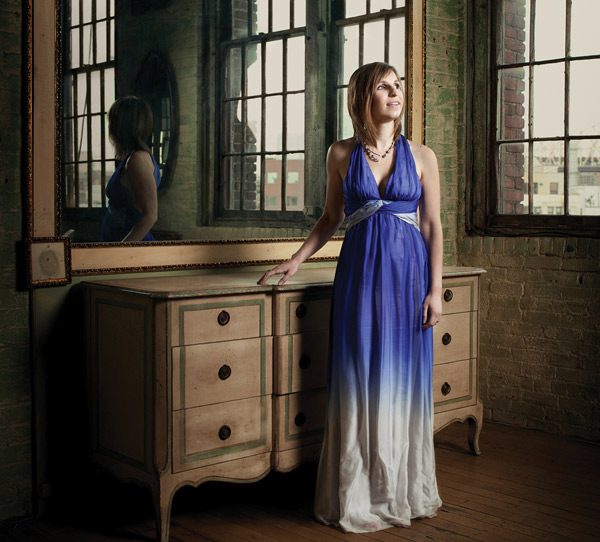The lesbian opera singer shares the story of her bright and brilliant life.
“She said to me, ‘Wow! I didn’t expect you to look so foxy,’” Laurie Rubin giggles, recounting the observation a librarian made during a recent reading for her memoir, Do You Dream In Color? Blind since birth, she has written about her life and the pivotal challenges and rewards that have crossed her path, dispelling misconceptions about blindness and the cynics in her life who told her she would never have a job, find romance or be independent. Clearly, they didn’t know Rubin.
Swayed by opera at a young age, the now internationally recognized mezzo-soprano has performed legendary recitals with world-renowned musicians, and is the recipient of many awards, including her maiden moment—the 1997 LA Music Center Spotlight Award. Adorned with ‘Bravas!’ Rubin shares her message of resilience through the beauty of music.
“Audiences have their own preconceived ideas of blindness. I don’t like to preach, but if I can sing about it, they can take their own interpretations away from the piece,” Rubin says. “You’re sharing something from your experience that they can take, which always keeps the music alive and relevant, and that’s when I feel most alive and happy—simply singing.”
Rubin has always been steered by a family of advocates. “I think I just always had a hunger for something better…I had supportive people in my family who were helping me find my way, and nobody made me ever feel lesser than anyone else…That’s what propelled me into a sense of security about myself and my confidence.”
Do You Dream In Color, the memoir title taken from the piece Rubin wrote with composer Bruce Adolphe, is a book about taking chances. Growing up, Rubin second-guessed herself, enamored with the idea of being social, but struggling for acceptance among her peers. She found a haven in music camp and was repeatedly invited to attend once-in-a-lifetime master class series and fellowship programs, under the wing of some of the world’s best music mentors.
In her last year at Oberlin College, where she played the role of Cenerentola in Rossini’s “La Cenerentola”—the classic Cinderella tale of a girl placed in the shadows, she asserted her stance as a musician: to conquer the lead role in a full opera—and the glass slipper fit just right.
When she was 22, Rubin was asked to perform Samuel Barber’s “Knoxville: Summer of 1915” with the man celebrated for his swelling film scores, conductor John Williams. “It was like going on stage with a family member. Conducting is a very personal thing. I never realized how intimate it is, because they’re taking in the music and when they feel the crescendo, and you’re feeling this next to them, you’re almost hearing it because they’ll take deep breaths. It was a bonding experience I never thought I’d have with a conductor.”
She cites another seminal mentor, fellow mezzo-soprano and legend Frederica von Stade, who taught her the art of humbleness. “One of the best voice tools is if you can sing with someone better than you,” says Rubin of Stade. “Your voice naturally develops a synergy with that other voice and you become a better singer, viscerally, without worrying about technique.” Stade invited Rubin and her family to her home when Rubin was asked to perform a duet with her for a benefit concert. In awe of Stade’s connectedness with others, making time to say hello to PTA friends at the local ice cream parlor, she now says, “That’s how I want to be. She’s an incredible artist, and I think being an incredible artist comes from having that humility.”

Someone in Rubin’s life, who approaches music in the same reverential way, is Rubin’s partner, Jenny Taira, who she met at Yale School of Music. In her book, Rubin chronicles clumsy slow dances with boys at summer camp and confronts her attraction to women. She writes: “Attraction isn’t about vision…It’s about an unmistakable vibe between two people. It’s about your heart stopping for a second when that person touches you, when something completely ordinary can make you giggle, when the very presence of that person makes you speechless. Not even your eyes can do all that for you.”
Ten years later, Rubin and Taira attribute their lasting relationship to honesty and togetherness, personal and professional. They live in Hawaii where they run Ohana Performing Arts and continue to collaborate on many projects, including an album they co-wrote, The Girl I Am. “You hear all the time, ‘Don’t go into business with your partner,’ but I find that it’s so nice that we can work together… It’s nice to know that there’s always something that we’re doing together that’s bigger than we are and our relationship, and that’s what keeps us going.” Ohana represents a chance to become an international gathering place, and for those interested in the performing arts, a welcome haven.
Of all of Rubin’s impactful performances, it’s in living rooms where she feels like she is giving and telling the most. She carries that into the concert halls too, emoting many senses as if we are deep within the forest den of her narrative. “Even though I’m in a room with 500 people, I feel like what my job is, is to connect with them and find something I feel is special and connect that with them through the music.”
Laurie Rubin says her aura is red, the same color as the gown she wore when she performed with John Williams. “I’ve never wanted to fly under the radar, because I’d be looked over for so many opportunities. I need to force people sometimes to see that I’m capable of succeeding.” (laurie-rubin.com)
